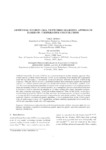Artificial Neuron–Glia Networks Learning Approach Based on Cooperative Coevolution

View/
Use this link to cite
http://hdl.handle.net/2183/17502Collections
- Investigación (FIC) [1728]
Metadata
Show full item recordTitle
Artificial Neuron–Glia Networks Learning Approach Based on Cooperative CoevolutionAuthor(s)
Date
2015-04-06Citation
Mesejo P, Ibáñez O, Fernández-Blanco F, et al. Artificial neuron–glia networks learning approach based on cooperative coevolution. Int J Neural Syst. 2015; 25(4):1550012
Abstract
[Abstract] Artificial Neuron–Glia Networks (ANGNs) are a novel bio-inspired machine learning approach. They extend classical Artificial Neural Networks (ANNs) by incorporating recent findings and suppositions about the way information is processed by neural and astrocytic networks in the most evolved living organisms. Although ANGNs are not a consolidated method, their performance against the traditional approach, i.e. without artificial astrocytes, was already demonstrated on classification problems. However, the corresponding learning algorithms developed so far strongly depends on a set of glial parameters which are manually tuned for each specific problem. As a consequence, previous experimental tests have to be done in order to determine an adequate set of values, making such manual parameter configuration time-consuming, error-prone, biased and problem dependent. Thus, in this paper, we propose a novel learning approach for ANGNs that fully automates the learning process, and gives the possibility of testing any kind of reasonable parameter configuration for each specific problem. This new learning algorithm, based on coevolutionary genetic algorithms, is able to properly learn all the ANGNs parameters. Its performance is tested on five classification problems achieving significantly better results than ANGN and competitive results with ANN approaches.
Keywords
Artificial neuron–glia networks
Artificial neural networks
Artificial astrocytes
Glial cells
Evolutionary algorithms
Cooperative coevolutionary genetic algorithm
Genetic algorithms
Parameter optimization
Classification
Artificial neural networks
Artificial astrocytes
Glial cells
Evolutionary algorithms
Cooperative coevolutionary genetic algorithm
Genetic algorithms
Parameter optimization
Classification
Editor version
Rights
Electronic version of an article published at World Scientific





